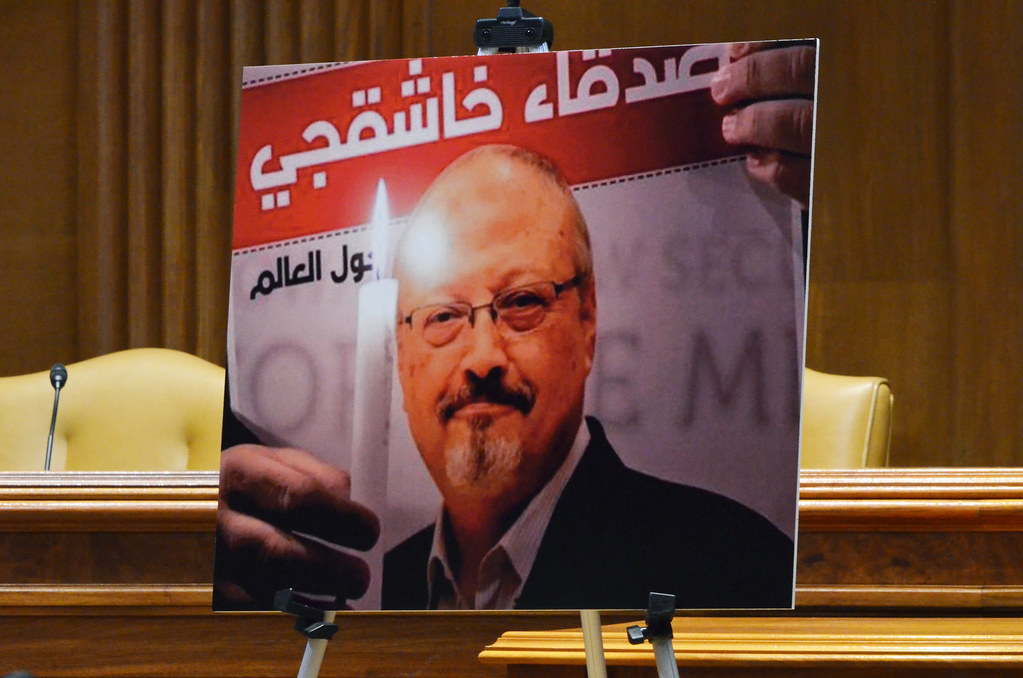Did the Trump Administration Warn Jamal Khashoggi He Was in Danger?
In September 2017, in his first column for the Washington Post, Saudi journalist Jamal Khashoggi described the repression in his home country as “unbearable” and called out Crown Prince Mohammed bin Salman for creating an environment of “fear” and “intimidation.” A year later, Khashoggi was murdered by a Saudi hit squad.

Published by The Lawfare Institute
in Cooperation With

In September 2017, in his first column for the Washington Post, Saudi journalist Jamal Khashoggi described the repression in his home country as “unbearable” and called out Crown Prince Mohammed bin Salman for creating an environment of “fear” and “intimidation.” A year later, Khashoggi was murdered by a Saudi hit squad. Between those two events, the crown prince told an aide that Khashoggi may need to be brought to heel “with a bullet” and Saudi officials developed a plan to kidnap the journalist, according to U.S. intelligence as reported in the New York Times and the Washington Post.
For the past year, we at the Committee to Protect Journalists (CPJ), a global press freedom and advocacy organization, have been asking the Trump administration one simple question: Did the United States warn Khashoggi of the threat against his life?
In January, we joined a Freedom of Information Act (FOIA) lawsuit that forced the government to release documents outlining the “Duty to Warn” process, which requires U.S. intelligence officers to warn targets of “an impending threat of intentional killing, serious bodily injury, or kidnapping,” according to National Security Agency documents obtained in the suit. If an intelligence officer declines to warn a threatened subject, he or she must provide written justification for that decision, according to those documents.
The Trump administration will not say whether they followed these procedures to inform Khashoggi of the threat to his life, despite reporting indicating that U.S. intelligence agencies had prior knowledge of the threat posed to him by the Saudi government. So on Sept. 26, we filed a brief in the U.S. District Court for the District of Columbia, asking a judge to compel the administration to disclose how it handled its Duty to Warn obligations for Khashoggi.
So far, the administration has stonewalled us. In court filings, they insist that merely acknowledging the existence—or nonexistence—of such documents would endanger national security. In particular, they have asserted an exception to FOIA known as the “Glomar” response, a reference to the Hughes Glomar Explorer, a secret CIA vessel that the agency refused to acknowledge the existence of when asked about it by journalists in the 1970s. Glomar has become a bipartisan tool to block journalistic document requests. It allows the government to claim that fulfilling a particular FOIA request would threaten national security, and it has been used to stymie inquiries into the torture of detainees by the George W. Bush administration and the expansion of the U.S. drone program under Obama.
It is not surprising that the Trump administration would invoke Glomar in our case. But, as we argue in our brief, there is ample reason to believe that they are seeking not to protect national security but simply to avoid embarrassment or cover up their failure. There is plenty of evidence to suggest that the Trump administration knew about threats to Khashoggi. As the Washington Post reported just days after his murder, the Saudi plan to kidnap Khashoggi was “disseminated throughout the U.S. government and was contained in reports that are routinely available to people working on U.S. policy toward Saudi Arabia.”
We are concerned that additional lives may be on the line. A year after Khashoggi’s murder, the administration seems intent on shielding the Saudi leadership from any responsibility for the killing—despite mounting evidence implicating the highest levels of government. The administration’s disregard for the safety of journalists is evident elsewhere as well. The New York Times revealed on Sept. 24 that Trump administration officials declined to help the newspaper’s reporter in Egypt when he was facing arrest.
This sends a chilling message to journalists all over the world. If they find themselves in the crosshairs of authoritarians, will the United States stand by them? Can the United States be counted on to follow its own policies about warning individuals at risk? These questions must be answered. The Trump administration cannot be allowed to change the subject by waving the broad banner of “national security.”
We respect the right of the intelligence community to protect its sources and methods. And we understand that, in certain instances—for example, in the midst of an undercover operation, or in cases involving advanced technology—merely acknowledging the existence of certain government activities could jeopardize national security.
But the Trump administration cannot be trusted to make these calls when it comes to the Khashoggi case. From the outset, the administration has tried to downplay the significance of his murder, as if the targeted assassination of a journalist were a routine part of international relations. When pressed on the Khashoggi case, President Trump said that only a “fool” would prioritize human rights above multimillion-dollar U.S. weapons sales to the Saudi government.
In court, the government is making a slightly different argument. To even acknowledge that the U.S. government knew (or didn’t know) about threats to Khashoggi, they argue, would tip off our enemies about U.S. intelligence capabilities. This rationale strains credulity. In the days after Khashoggi’s murder, the State Department’s own spokesperson, Robert Palladino, said in public that the government had “no advance knowledge” of Khashoggi’s disappearance. Although Palladino’s statement contradicts numerous subsequent news reports, it reveals that the Trump administration was more than willing to discuss what it knew—at least when that information supported its own narrative.
The Duty to Warn is not an obscure or seldom-used diplomatic tool. In the year since Khashoggi was killed by a Saudi team in Turkey, the U.S. government has invoked the provision to warn three other dissidents living abroad of Saudi threats to their lives, according to a report in Time magazine. Those warnings are now in the public record, with no discernable consequences for national security. Indeed, by its very nature, the Duty to Warn requires intelligence agents to disclose threats to civilians outside the intelligence world. In this context, the Trump administration’s Glomar argument in the Khashoggi case makes little sense.
In the last column he wrote before his murder, Khashoggi addressed the “silence” that too often follows attacks on the press. We at CPJ are familiar with the impunity that can surround the murder of a journalist—more often than not, those in power do not want a credible investigation, preferring instead to deflect blame and change the subject. Our lawsuit is about making sure the United States does not join the ranks of countries where this kind of impunity reigns. We can still set a global example for press freedom, transparency and accountability, even in these trying times.



.jpeg?sfvrsn=ad4bd1de_5)

